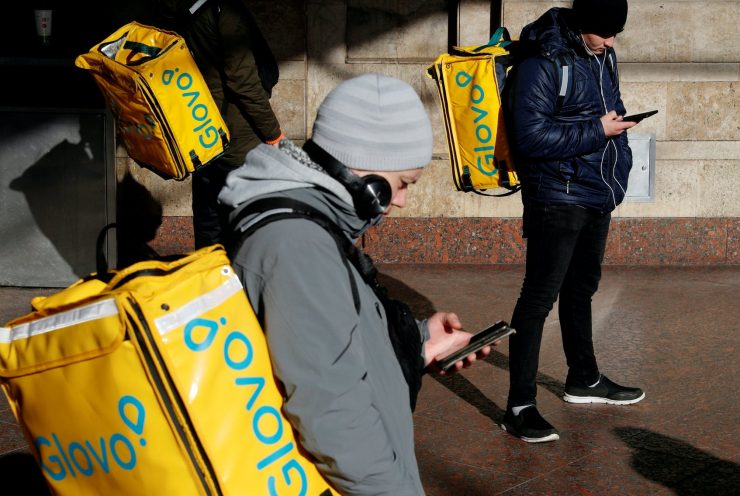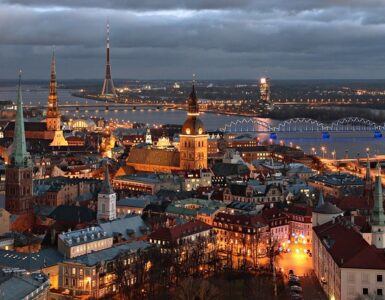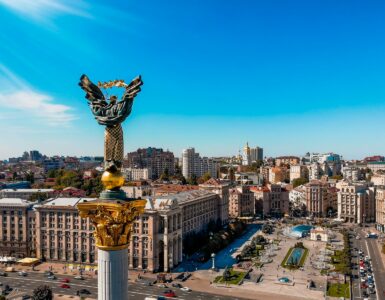RUSSIA IN CRISIS
The European Union has widened the sanctions against Russia and Belarus in response to Russia’s invasion of Ukraine and assistance of Belarus. The sanctions include restrictions of SWIFT services, prohibition of certain financial transactions as well as supply of high-tech products. [Source: The European Commission]
World rating agencies – Fitch, S&P, and Moody’s – have downgraded Russia’s sovereign ratings. Analysts at the agencies say Russia’s default on its sovereign debt looks imminent. [Source: Newsweek]
Russia is nearing a default on its $40 billion external bonds, the World Bank warned. This can happen due to the sanctions imposed on the country over the invasion of Ukraine. The IMF called a broader financial crisis unlikely, saying global banks’ $120 billion exposure to Russia is “not systemically relevant.” For now. [Source: Reuters, CNBC]
The U.K. banned export of aviation and space products and technologies to Russia, the latest move in Russia’s increasingly isolated position in global space exploration and dwinding partnership agreements. Earlier this month, former NASA astronaut Scott Kelly taunted Rogozin that without international cooperation and infusion of cash Russia’s space program will soon amount to nothing. [Source: RBC, Newsweek]
The European Commission has included cryptocurrencies in the set of financial tools subject to the sanctions imposed on companies and individuals in Russia and Belarus. Crypto assets were deemed ‘transferable securities,’ so the same approach must be applied to them as to other assets. [Source: Decrypt]
Russia’s biggest marketplace Wildberries has waived charges for storing goods for its vendors to help them survive the crisis. The cancellation will last at least a month with a possible extension. [Source: RB]
The list of companies that have suspended or ceased operations in Russia is growing: Western Union, WarnerMedia, Avast, McDonalds, Atlassian, Epic Games, Steam, Nintendo, Lumen, Riot Games, Akamai, Amazon Prime Video, Sony Music, Herbalife, Paramount Pictures and Walt Disney Company have joined the ranks. Some of them cite difficulties with doing financial operations and logistics.
[Source: TJournal]A global multi-category delivery player Glovo announced it has partially restarted its services in 20 Ukraine cities. The company referred to an increased demand from residents and NGOs for food, medicines and other essentials. The company said it will waive commissions for its local partners working in support of Ukraine.
[Source: Glovo]BANKS
Russia’s national payment system Mir is emerging as the early winner from foreign restrictions, with Bank VTB registering a record number of applications for bank cards. The record inflow of customers is fueled by the Mastercard and Visa suspending international services for Russian card holders.
[Source: VTB, Private Banker International]CERN, a Switzerland-based particle physics lab, has suspended cooperation with Russian scientific organizations, although 1100 Russian scientists will be able to continue their work on the existing project.The move followed the decision by the European Organization for Nuclear Research to ban Russia from participation in new research programs.
[Source: Science Business]Google limited the capabilities of Google Play in Russia, with users only able to download free apps now.
[Source: 3Dnews]The freelance marketplace UpWork will stop serving users from Russia and Belarus as of May 1. Until then, new registrations will be forbidden and payments for the current works will be completed.
[Source: UpWork]SOCIAL MEDIA
Instagram has been blocked in Russia by the country’s communications regulator Roskomnadzor as of March 14. The government agency said it did it in response to Meta’s decision to allow users from Georgia, Poland, and Ukraine to call for violence towards Russian military personnel deployed in Ukraine.
[Source: RBC]Social network VK launched the biggest incentive program for bloggers costing nearly $513,000. Over the coming month bloggers will get 100% of the revenue they earn through ads.
[Source: VK]VK registered record traffic following the closure of Facebook and Twitter in Russia. Over the last two weeks, views of video increased by 40%, the number of new users grew by 20%, the number of calls by 12% compared to the period before the invasion of Ukraine.
[Source: VK]SCIENCE
The Russian government will allocate $42.8 million for nuclear energy research in 2022. Prime Minister Mikhail Mishustin said he hopes scientists will manage to get a source of the clean energy, which in his opinion could be the controlled thermonuclear fusion.
[Source: 3Dnews]Students of the St. Petersburg State University of Industrial Technologies and Design have developed the formula of a substance that can be effective in cancer and HIV treatment. They managed to enhance the activity of the active agent, betulin, a triterpene, contained in the bark of birch trees.
[Source: TASS]E-TRANSPORT
The Russian government will invest $11.7 million in building the infrastructure for e-vehicles in 2022. The funds will be spent on the construction of more than 500 powerful charging stations in 12 regions along national highways.
[Source: The Russian Government]INTERNET
Investor Esther Dyson and Stanford economist Ilya Strebulaev have resigned from Yandex’s board of directors, Russia’s biggest Internet company. Dyson has served as an independent non-executive director since 2006. Strebulaev, who has been on the board since 2018, has signed an open letter from economists calling for the end to Russia’s war.
[Source: AP News]





Add comment